Analysis of Essential Capabilities in Human Resource Management (HRM)
VerifiedAdded on 2023/06/07
|7
|1582
|412
Report
AI Summary
This report analyzes three essential capabilities for Human Resource Management (HRM) professionals: being business-driven, acting as an ethical and credible activist, and fostering a multicultural workplace with effective change management. The report discusses how a business-driven approach aligns HRM with organizational goals, enhancing productivity and profitability. It emphasizes the importance of ethical conduct in setting standards and promoting ethical awareness within the organization. Additionally, it highlights the role of HR in creating an inclusive and respectful environment while leading change initiatives. The report underscores the importance of these capabilities in achieving strategic objectives, building a competitive edge, and promoting a healthy organizational culture. A reflective section provides personal examples demonstrating these capabilities, highlighting the practical application of these skills in a real-world context.
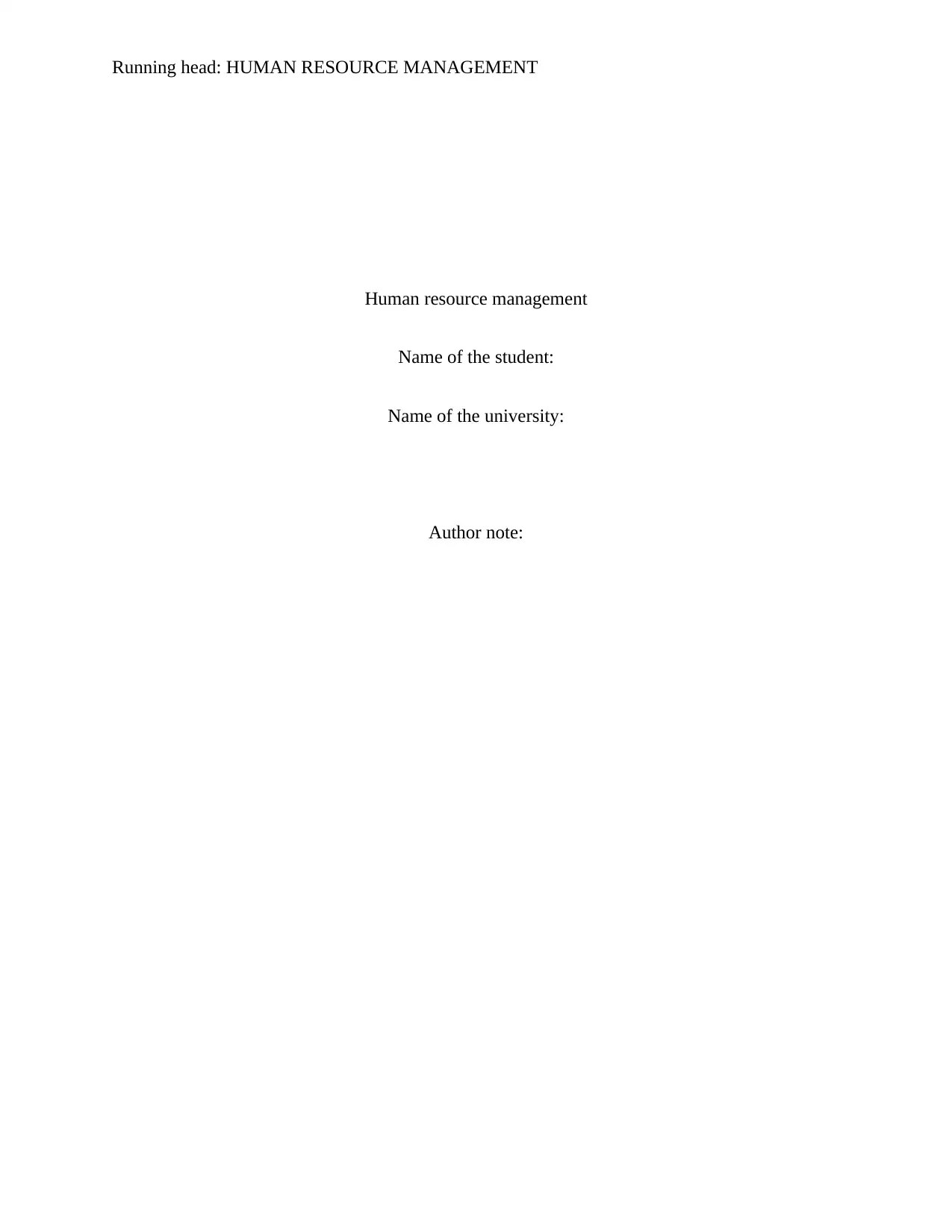
Running head: HUMAN RESOURCE MANAGEMENT
Human resource management
Name of the student:
Name of the university:
Author note:
Human resource management
Name of the student:
Name of the university:
Author note:
Paraphrase This Document
Need a fresh take? Get an instant paraphrase of this document with our AI Paraphraser
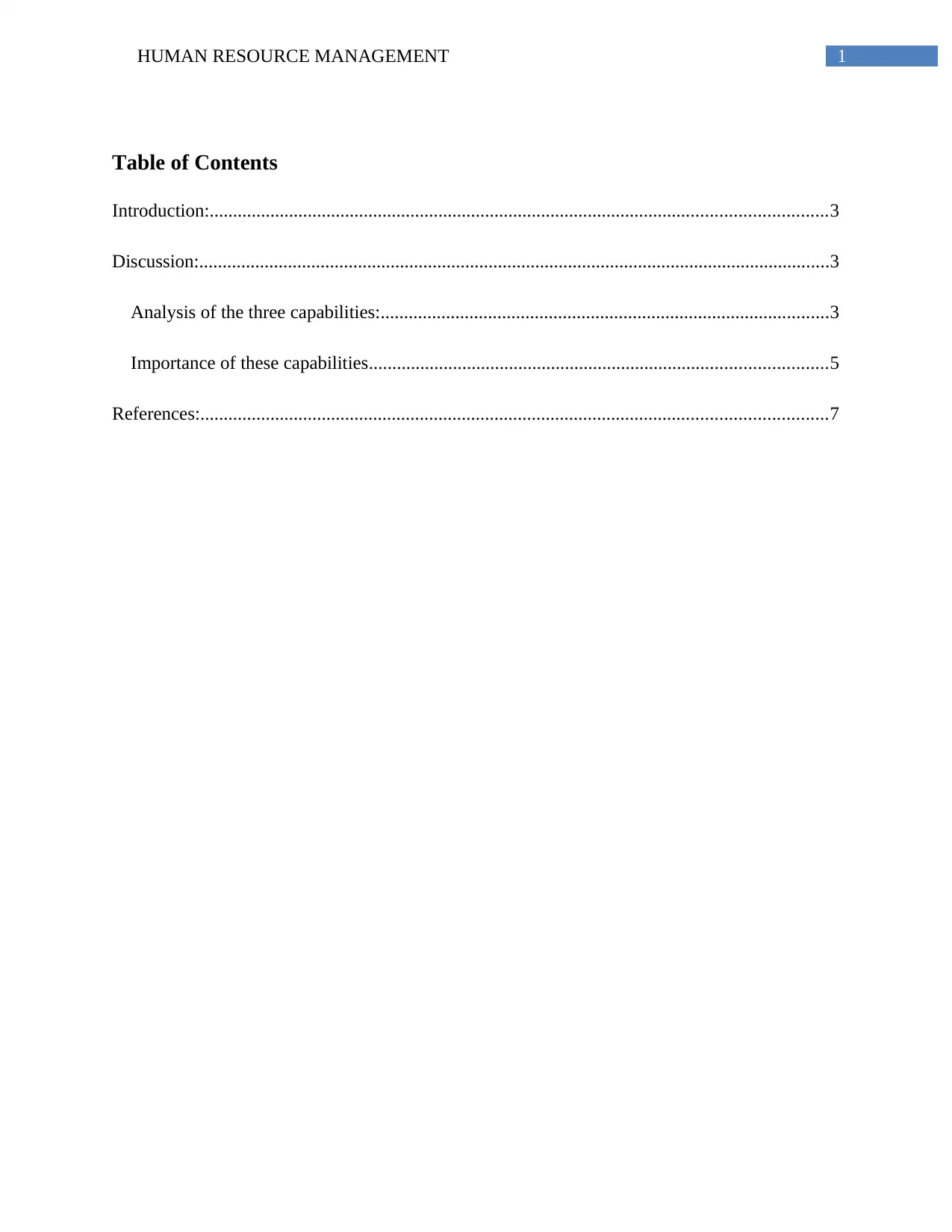
1HUMAN RESOURCE MANAGEMENT
Table of Contents
Introduction:....................................................................................................................................3
Discussion:.......................................................................................................................................3
Analysis of the three capabilities:................................................................................................3
Importance of these capabilities..................................................................................................5
References:......................................................................................................................................7
Table of Contents
Introduction:....................................................................................................................................3
Discussion:.......................................................................................................................................3
Analysis of the three capabilities:................................................................................................3
Importance of these capabilities..................................................................................................5
References:......................................................................................................................................7
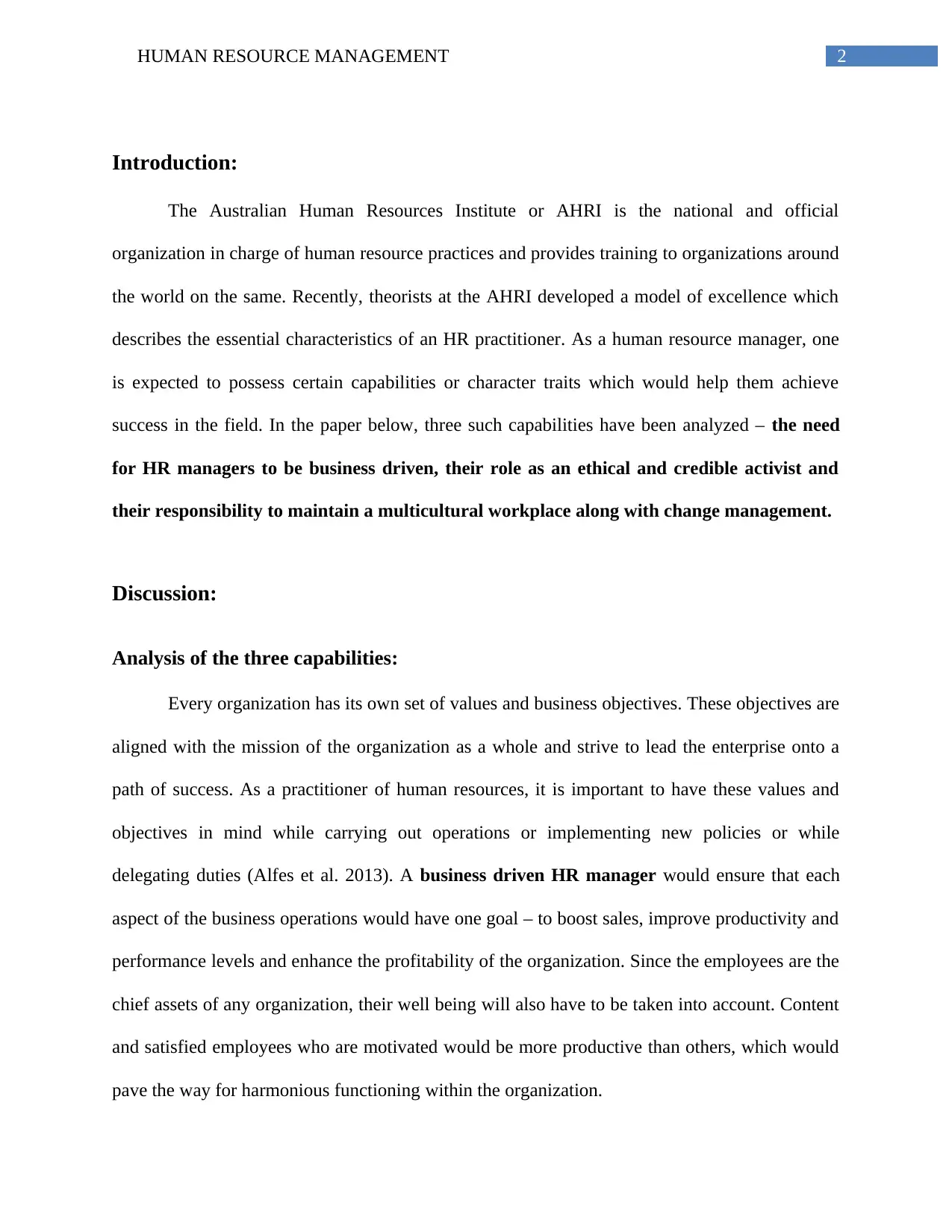
2HUMAN RESOURCE MANAGEMENT
Introduction:
The Australian Human Resources Institute or AHRI is the national and official
organization in charge of human resource practices and provides training to organizations around
the world on the same. Recently, theorists at the AHRI developed a model of excellence which
describes the essential characteristics of an HR practitioner. As a human resource manager, one
is expected to possess certain capabilities or character traits which would help them achieve
success in the field. In the paper below, three such capabilities have been analyzed – the need
for HR managers to be business driven, their role as an ethical and credible activist and
their responsibility to maintain a multicultural workplace along with change management.
Discussion:
Analysis of the three capabilities:
Every organization has its own set of values and business objectives. These objectives are
aligned with the mission of the organization as a whole and strive to lead the enterprise onto a
path of success. As a practitioner of human resources, it is important to have these values and
objectives in mind while carrying out operations or implementing new policies or while
delegating duties (Alfes et al. 2013). A business driven HR manager would ensure that each
aspect of the business operations would have one goal – to boost sales, improve productivity and
performance levels and enhance the profitability of the organization. Since the employees are the
chief assets of any organization, their well being will also have to be taken into account. Content
and satisfied employees who are motivated would be more productive than others, which would
pave the way for harmonious functioning within the organization.
Introduction:
The Australian Human Resources Institute or AHRI is the national and official
organization in charge of human resource practices and provides training to organizations around
the world on the same. Recently, theorists at the AHRI developed a model of excellence which
describes the essential characteristics of an HR practitioner. As a human resource manager, one
is expected to possess certain capabilities or character traits which would help them achieve
success in the field. In the paper below, three such capabilities have been analyzed – the need
for HR managers to be business driven, their role as an ethical and credible activist and
their responsibility to maintain a multicultural workplace along with change management.
Discussion:
Analysis of the three capabilities:
Every organization has its own set of values and business objectives. These objectives are
aligned with the mission of the organization as a whole and strive to lead the enterprise onto a
path of success. As a practitioner of human resources, it is important to have these values and
objectives in mind while carrying out operations or implementing new policies or while
delegating duties (Alfes et al. 2013). A business driven HR manager would ensure that each
aspect of the business operations would have one goal – to boost sales, improve productivity and
performance levels and enhance the profitability of the organization. Since the employees are the
chief assets of any organization, their well being will also have to be taken into account. Content
and satisfied employees who are motivated would be more productive than others, which would
pave the way for harmonious functioning within the organization.
⊘ This is a preview!⊘
Do you want full access?
Subscribe today to unlock all pages.

Trusted by 1+ million students worldwide
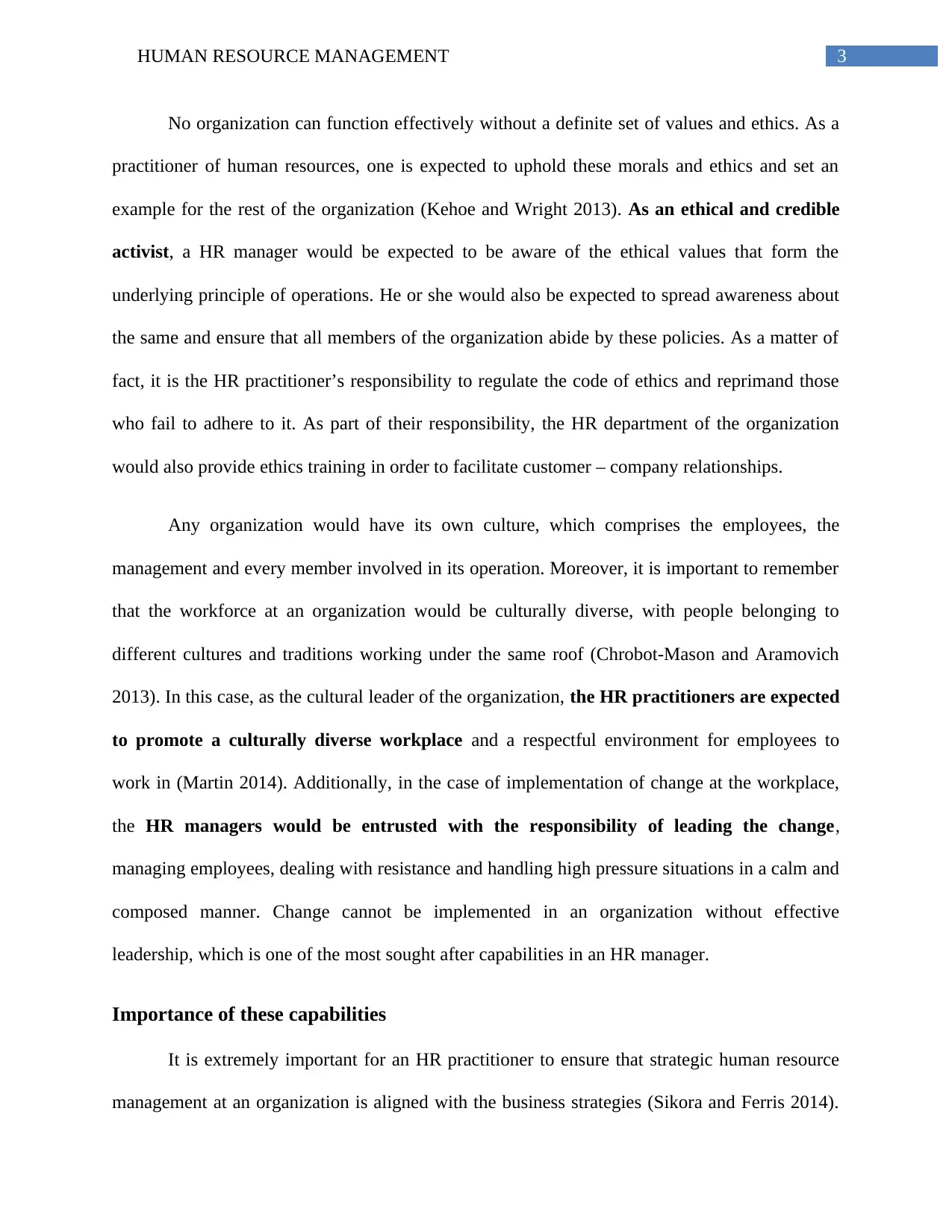
3HUMAN RESOURCE MANAGEMENT
No organization can function effectively without a definite set of values and ethics. As a
practitioner of human resources, one is expected to uphold these morals and ethics and set an
example for the rest of the organization (Kehoe and Wright 2013). As an ethical and credible
activist, a HR manager would be expected to be aware of the ethical values that form the
underlying principle of operations. He or she would also be expected to spread awareness about
the same and ensure that all members of the organization abide by these policies. As a matter of
fact, it is the HR practitioner’s responsibility to regulate the code of ethics and reprimand those
who fail to adhere to it. As part of their responsibility, the HR department of the organization
would also provide ethics training in order to facilitate customer – company relationships.
Any organization would have its own culture, which comprises the employees, the
management and every member involved in its operation. Moreover, it is important to remember
that the workforce at an organization would be culturally diverse, with people belonging to
different cultures and traditions working under the same roof (Chrobot-Mason and Aramovich
2013). In this case, as the cultural leader of the organization, the HR practitioners are expected
to promote a culturally diverse workplace and a respectful environment for employees to
work in (Martin 2014). Additionally, in the case of implementation of change at the workplace,
the HR managers would be entrusted with the responsibility of leading the change,
managing employees, dealing with resistance and handling high pressure situations in a calm and
composed manner. Change cannot be implemented in an organization without effective
leadership, which is one of the most sought after capabilities in an HR manager.
Importance of these capabilities
It is extremely important for an HR practitioner to ensure that strategic human resource
management at an organization is aligned with the business strategies (Sikora and Ferris 2014).
No organization can function effectively without a definite set of values and ethics. As a
practitioner of human resources, one is expected to uphold these morals and ethics and set an
example for the rest of the organization (Kehoe and Wright 2013). As an ethical and credible
activist, a HR manager would be expected to be aware of the ethical values that form the
underlying principle of operations. He or she would also be expected to spread awareness about
the same and ensure that all members of the organization abide by these policies. As a matter of
fact, it is the HR practitioner’s responsibility to regulate the code of ethics and reprimand those
who fail to adhere to it. As part of their responsibility, the HR department of the organization
would also provide ethics training in order to facilitate customer – company relationships.
Any organization would have its own culture, which comprises the employees, the
management and every member involved in its operation. Moreover, it is important to remember
that the workforce at an organization would be culturally diverse, with people belonging to
different cultures and traditions working under the same roof (Chrobot-Mason and Aramovich
2013). In this case, as the cultural leader of the organization, the HR practitioners are expected
to promote a culturally diverse workplace and a respectful environment for employees to
work in (Martin 2014). Additionally, in the case of implementation of change at the workplace,
the HR managers would be entrusted with the responsibility of leading the change,
managing employees, dealing with resistance and handling high pressure situations in a calm and
composed manner. Change cannot be implemented in an organization without effective
leadership, which is one of the most sought after capabilities in an HR manager.
Importance of these capabilities
It is extremely important for an HR practitioner to ensure that strategic human resource
management at an organization is aligned with the business strategies (Sikora and Ferris 2014).
Paraphrase This Document
Need a fresh take? Get an instant paraphrase of this document with our AI Paraphraser
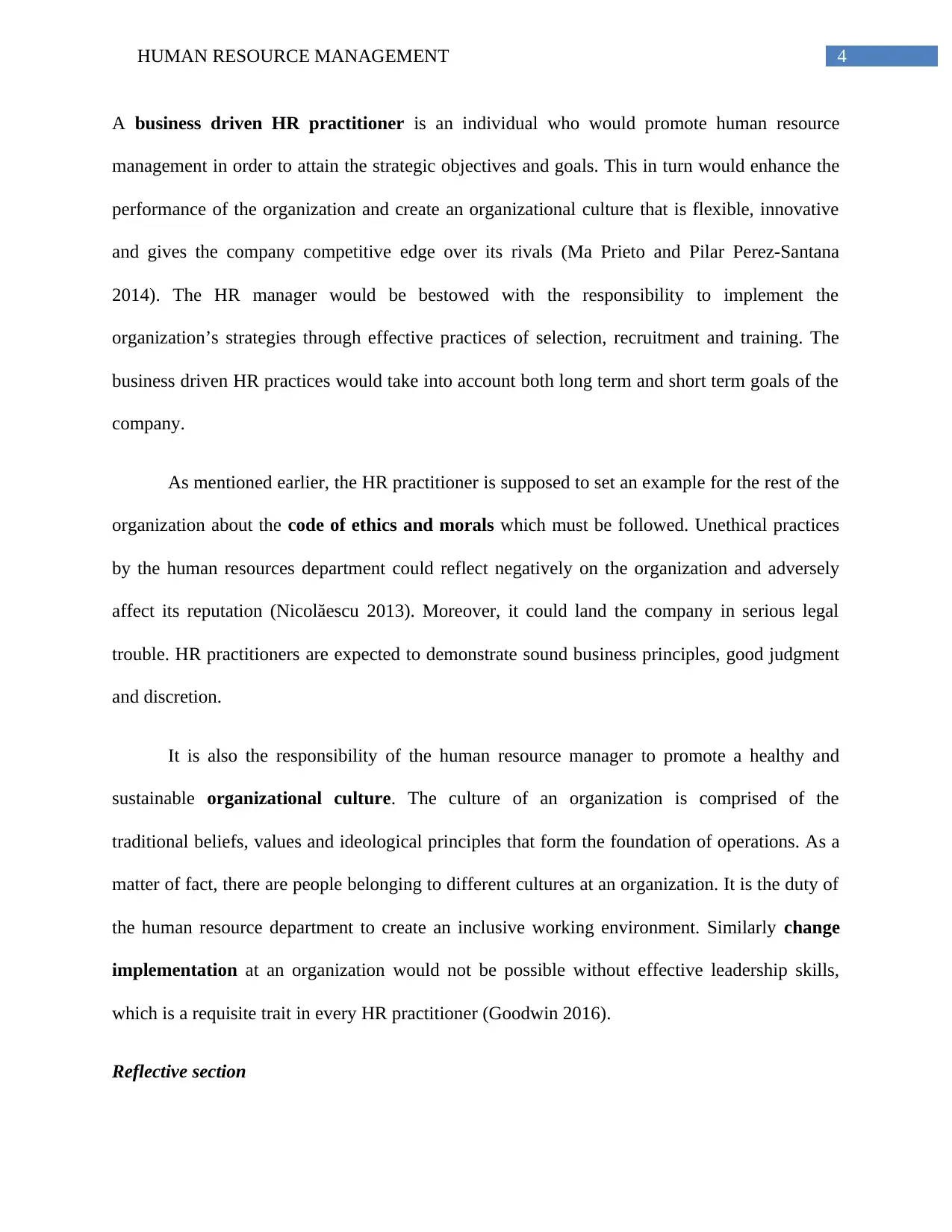
4HUMAN RESOURCE MANAGEMENT
A business driven HR practitioner is an individual who would promote human resource
management in order to attain the strategic objectives and goals. This in turn would enhance the
performance of the organization and create an organizational culture that is flexible, innovative
and gives the company competitive edge over its rivals (Ma Prieto and Pilar Perez-Santana
2014). The HR manager would be bestowed with the responsibility to implement the
organization’s strategies through effective practices of selection, recruitment and training. The
business driven HR practices would take into account both long term and short term goals of the
company.
As mentioned earlier, the HR practitioner is supposed to set an example for the rest of the
organization about the code of ethics and morals which must be followed. Unethical practices
by the human resources department could reflect negatively on the organization and adversely
affect its reputation (Nicolăescu 2013). Moreover, it could land the company in serious legal
trouble. HR practitioners are expected to demonstrate sound business principles, good judgment
and discretion.
It is also the responsibility of the human resource manager to promote a healthy and
sustainable organizational culture. The culture of an organization is comprised of the
traditional beliefs, values and ideological principles that form the foundation of operations. As a
matter of fact, there are people belonging to different cultures at an organization. It is the duty of
the human resource department to create an inclusive working environment. Similarly change
implementation at an organization would not be possible without effective leadership skills,
which is a requisite trait in every HR practitioner (Goodwin 2016).
Reflective section
A business driven HR practitioner is an individual who would promote human resource
management in order to attain the strategic objectives and goals. This in turn would enhance the
performance of the organization and create an organizational culture that is flexible, innovative
and gives the company competitive edge over its rivals (Ma Prieto and Pilar Perez-Santana
2014). The HR manager would be bestowed with the responsibility to implement the
organization’s strategies through effective practices of selection, recruitment and training. The
business driven HR practices would take into account both long term and short term goals of the
company.
As mentioned earlier, the HR practitioner is supposed to set an example for the rest of the
organization about the code of ethics and morals which must be followed. Unethical practices
by the human resources department could reflect negatively on the organization and adversely
affect its reputation (Nicolăescu 2013). Moreover, it could land the company in serious legal
trouble. HR practitioners are expected to demonstrate sound business principles, good judgment
and discretion.
It is also the responsibility of the human resource manager to promote a healthy and
sustainable organizational culture. The culture of an organization is comprised of the
traditional beliefs, values and ideological principles that form the foundation of operations. As a
matter of fact, there are people belonging to different cultures at an organization. It is the duty of
the human resource department to create an inclusive working environment. Similarly change
implementation at an organization would not be possible without effective leadership skills,
which is a requisite trait in every HR practitioner (Goodwin 2016).
Reflective section
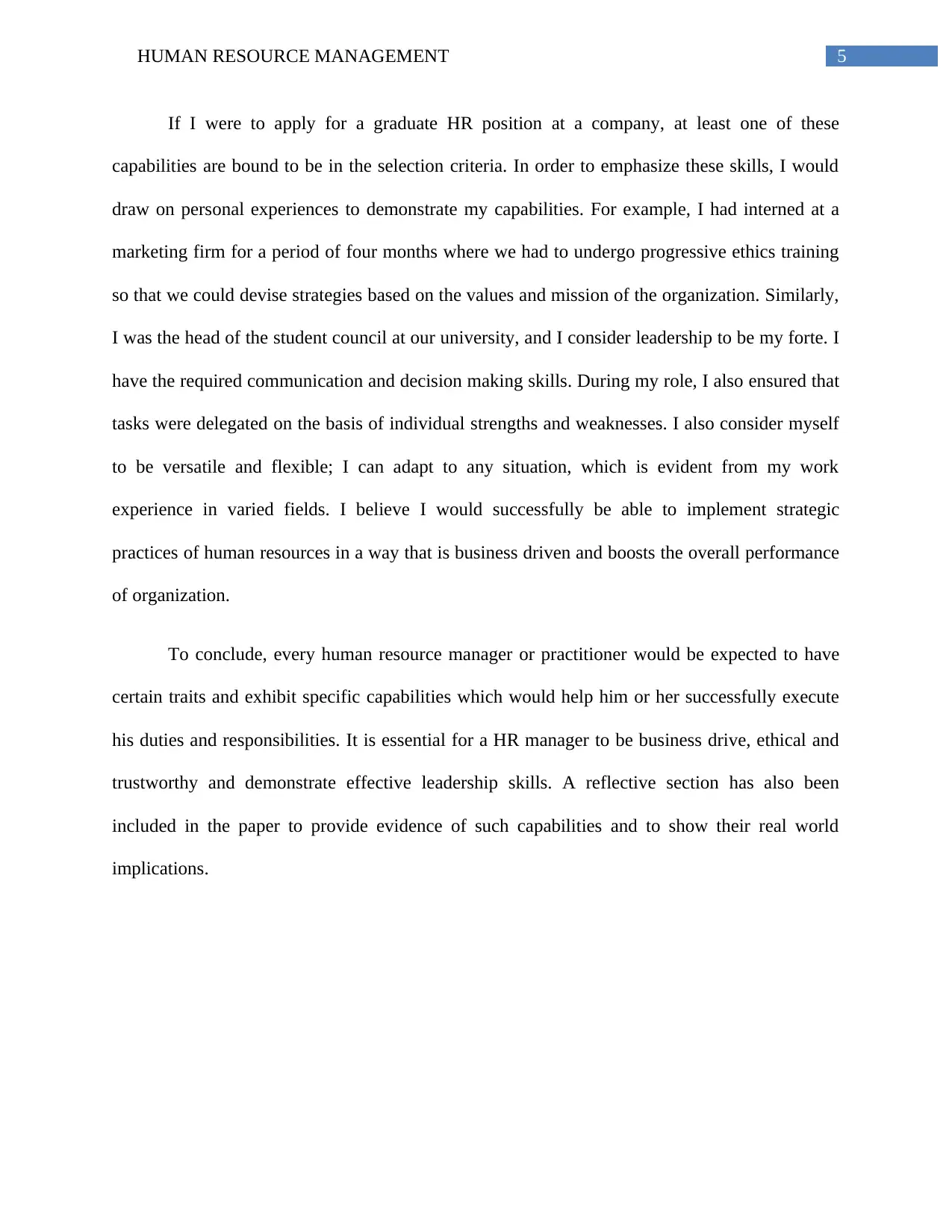
5HUMAN RESOURCE MANAGEMENT
If I were to apply for a graduate HR position at a company, at least one of these
capabilities are bound to be in the selection criteria. In order to emphasize these skills, I would
draw on personal experiences to demonstrate my capabilities. For example, I had interned at a
marketing firm for a period of four months where we had to undergo progressive ethics training
so that we could devise strategies based on the values and mission of the organization. Similarly,
I was the head of the student council at our university, and I consider leadership to be my forte. I
have the required communication and decision making skills. During my role, I also ensured that
tasks were delegated on the basis of individual strengths and weaknesses. I also consider myself
to be versatile and flexible; I can adapt to any situation, which is evident from my work
experience in varied fields. I believe I would successfully be able to implement strategic
practices of human resources in a way that is business driven and boosts the overall performance
of organization.
To conclude, every human resource manager or practitioner would be expected to have
certain traits and exhibit specific capabilities which would help him or her successfully execute
his duties and responsibilities. It is essential for a HR manager to be business drive, ethical and
trustworthy and demonstrate effective leadership skills. A reflective section has also been
included in the paper to provide evidence of such capabilities and to show their real world
implications.
If I were to apply for a graduate HR position at a company, at least one of these
capabilities are bound to be in the selection criteria. In order to emphasize these skills, I would
draw on personal experiences to demonstrate my capabilities. For example, I had interned at a
marketing firm for a period of four months where we had to undergo progressive ethics training
so that we could devise strategies based on the values and mission of the organization. Similarly,
I was the head of the student council at our university, and I consider leadership to be my forte. I
have the required communication and decision making skills. During my role, I also ensured that
tasks were delegated on the basis of individual strengths and weaknesses. I also consider myself
to be versatile and flexible; I can adapt to any situation, which is evident from my work
experience in varied fields. I believe I would successfully be able to implement strategic
practices of human resources in a way that is business driven and boosts the overall performance
of organization.
To conclude, every human resource manager or practitioner would be expected to have
certain traits and exhibit specific capabilities which would help him or her successfully execute
his duties and responsibilities. It is essential for a HR manager to be business drive, ethical and
trustworthy and demonstrate effective leadership skills. A reflective section has also been
included in the paper to provide evidence of such capabilities and to show their real world
implications.
⊘ This is a preview!⊘
Do you want full access?
Subscribe today to unlock all pages.

Trusted by 1+ million students worldwide
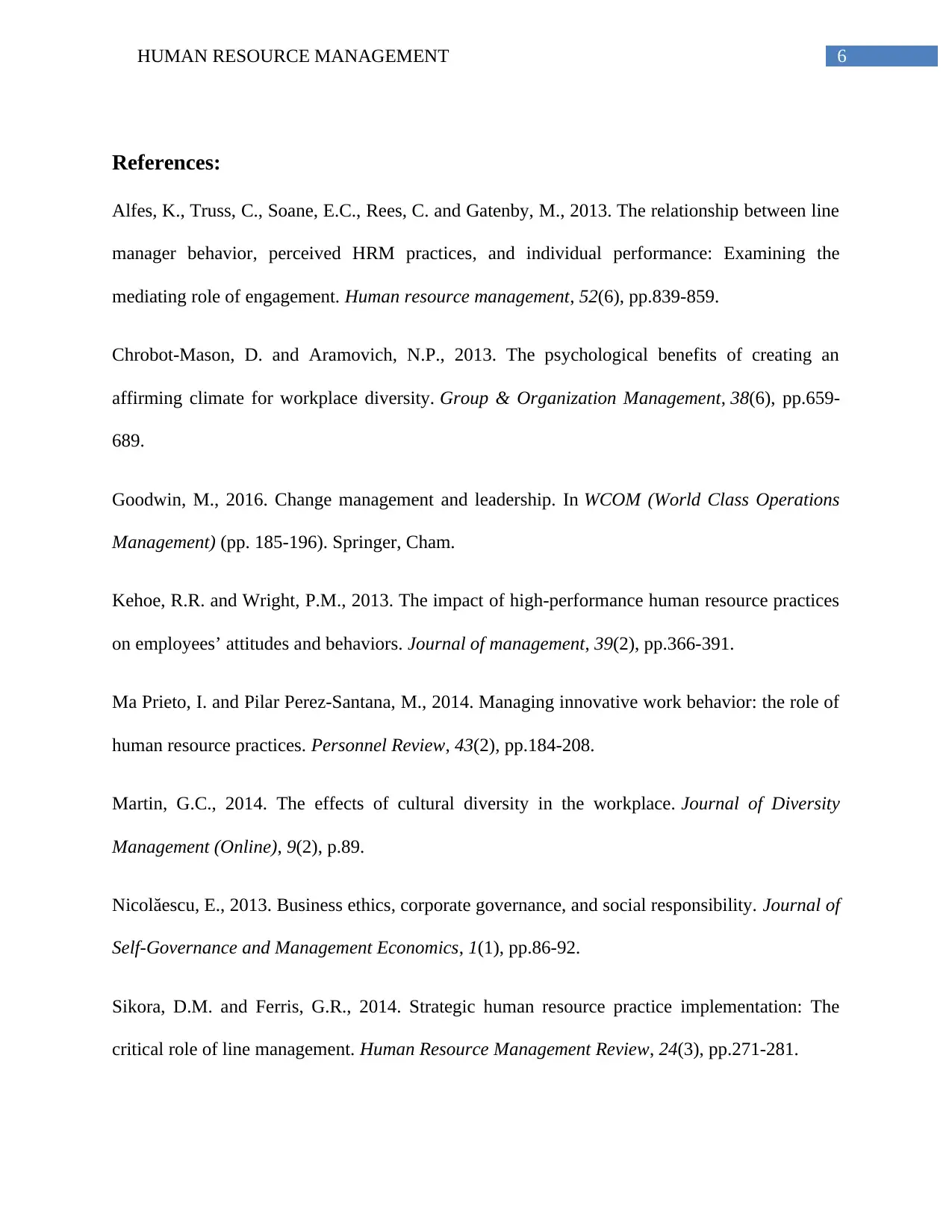
6HUMAN RESOURCE MANAGEMENT
References:
Alfes, K., Truss, C., Soane, E.C., Rees, C. and Gatenby, M., 2013. The relationship between line
manager behavior, perceived HRM practices, and individual performance: Examining the
mediating role of engagement. Human resource management, 52(6), pp.839-859.
Chrobot-Mason, D. and Aramovich, N.P., 2013. The psychological benefits of creating an
affirming climate for workplace diversity. Group & Organization Management, 38(6), pp.659-
689.
Goodwin, M., 2016. Change management and leadership. In WCOM (World Class Operations
Management) (pp. 185-196). Springer, Cham.
Kehoe, R.R. and Wright, P.M., 2013. The impact of high-performance human resource practices
on employees’ attitudes and behaviors. Journal of management, 39(2), pp.366-391.
Ma Prieto, I. and Pilar Perez-Santana, M., 2014. Managing innovative work behavior: the role of
human resource practices. Personnel Review, 43(2), pp.184-208.
Martin, G.C., 2014. The effects of cultural diversity in the workplace. Journal of Diversity
Management (Online), 9(2), p.89.
Nicolăescu, E., 2013. Business ethics, corporate governance, and social responsibility. Journal of
Self-Governance and Management Economics, 1(1), pp.86-92.
Sikora, D.M. and Ferris, G.R., 2014. Strategic human resource practice implementation: The
critical role of line management. Human Resource Management Review, 24(3), pp.271-281.
References:
Alfes, K., Truss, C., Soane, E.C., Rees, C. and Gatenby, M., 2013. The relationship between line
manager behavior, perceived HRM practices, and individual performance: Examining the
mediating role of engagement. Human resource management, 52(6), pp.839-859.
Chrobot-Mason, D. and Aramovich, N.P., 2013. The psychological benefits of creating an
affirming climate for workplace diversity. Group & Organization Management, 38(6), pp.659-
689.
Goodwin, M., 2016. Change management and leadership. In WCOM (World Class Operations
Management) (pp. 185-196). Springer, Cham.
Kehoe, R.R. and Wright, P.M., 2013. The impact of high-performance human resource practices
on employees’ attitudes and behaviors. Journal of management, 39(2), pp.366-391.
Ma Prieto, I. and Pilar Perez-Santana, M., 2014. Managing innovative work behavior: the role of
human resource practices. Personnel Review, 43(2), pp.184-208.
Martin, G.C., 2014. The effects of cultural diversity in the workplace. Journal of Diversity
Management (Online), 9(2), p.89.
Nicolăescu, E., 2013. Business ethics, corporate governance, and social responsibility. Journal of
Self-Governance and Management Economics, 1(1), pp.86-92.
Sikora, D.M. and Ferris, G.R., 2014. Strategic human resource practice implementation: The
critical role of line management. Human Resource Management Review, 24(3), pp.271-281.
1 out of 7
Related Documents
Your All-in-One AI-Powered Toolkit for Academic Success.
+13062052269
info@desklib.com
Available 24*7 on WhatsApp / Email
![[object Object]](/_next/static/media/star-bottom.7253800d.svg)
Unlock your academic potential
Copyright © 2020–2026 A2Z Services. All Rights Reserved. Developed and managed by ZUCOL.





